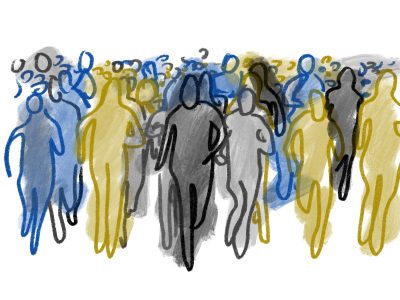What’s blue and yellow and 26.2 miles all over? The 125th Boston Marathon, which is set to look slightly different this year.
For one, the historic competition has been pushed back to Oct. 11. Last year, the marathon was rescheduled similarly before being canceled altogether due to COVID-19 safety regulations. Those who were already registered had the opportunity to compete virtually.
Hopefully, the anticipated arrival of Phase Four and mass vaccinations will allow a scaled-down, in-person road race. If Massachusetts lets the event continue, the race may provide some much-needed semblance of normality for Boston residents.
The city is rich with history, and along with being the nation’s most recognized and oldest annual marathon, the Boston Marathon has local cultural significance. Especially since many other events or holidays have been canceled — such as the St. Patrick’s Day Parade — the race serves to boost morale and maintain the spirit of the city, giving residents and participants something to look forward to.

The in-person race is anticipated to be smaller than previous years due to safety concerns, but the actual capacity hasn’t been determined yet. Just as with previous years, though, 20 percent of the runners will be by-invitation, including charity program runners — last year, the Boston Athletic Association was able to raise more than $400 million despite the pandemic.
Because COVID-19 has disrupted many fundraising efforts and decreased donor engagement for many nonprofit organizations, the pull of an in-person Boston Marathon could help the charity landscape immensely.
In addition to the traditional, in-person race, the BAA announced an additional virtual component.
Capped at 70,000 participants on a first-come-first-serve basis, the virtual race also has no qualifying time needed to enter. This means, for the first time ever, anyone can register to compete in the marathon — and if they can complete the entire 26.2 miles without stopping, they’ll be awarded a medal.
There are concerns that the virtual race will detract from the competitive, rigorous nature of the marathon. Will allowing anyone to compete and raising the number of participants drastically lose what makes the Boston Marathon so difficult and nationally recognized?
One commenter on a Boston.com article noted virtual races don’t have the same appeal. Without the course and the qualifying time, it’s just a “let’s pretend it’s the real Boston Marathon race.”
The details of the marathon are currently unclear, but if entry fees remain for the virtual race, $180 or more may not be worth it for some runners.
On the other hand, the marathon will be more accessible than ever. You don’t have to be a hardcore athlete or marathon veteran to run, nor do you have to plan a trip to Boston.
Because it’s so well-known and such a widely important event, the virtual marathon may incentivize many regular people to sign up, prepare for the run and exercise instead of staying inside on Zoom calls all day. It can also instill a sense of purpose in those hoping to compete.
Being able to hold the marathon in any capacity this year is a big deal and a great way to bring people together, even if it’s virtual.
It may seem premature to say an in-person event is possible. Even though Fenway Stadium is set to open in a couple of weeks at a 12 percent capacity, we should still exercise caution. The pandemic is by no means over, and the reopening of many large stadiums, arenas and venues may induce a false sense of security.
If the marathon attracts the regular national or even international crowd, it could also pose a risk to the Boston community.
However, the Johnson and Johnson vaccine has recently been approved, and the marathon definitely appears to be within reach. Besides, October is still distant in the future, and with quarantining, masks, social distancing, vaccinations and perhaps staggering of the race, it could go off without a hitch.
The marathon demonstrates how Boston traditions continue to persevere and connect us during a time of severe isolation. Perhaps it can also inspire us to fight against the COVID-19 fatigue and keep us Boston Strong through the last stretch of the pandemic.
















































































































